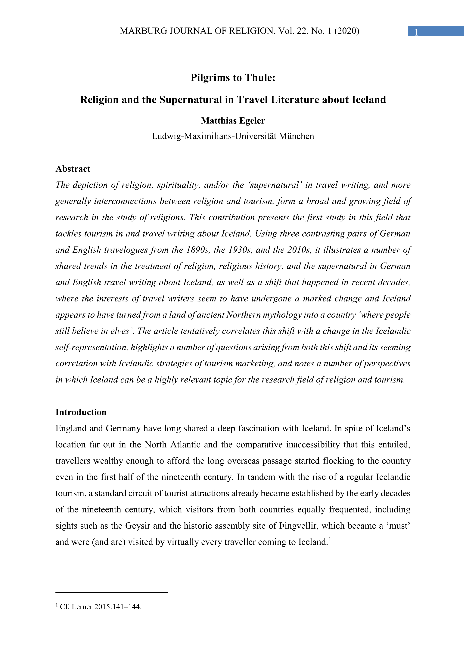Pilgrims to Thule Religion and the Supernatural in Travel Literature about Iceland
The depiction of religion, spirituality, and/or the ‘supernatural’ in travel writing, and more generally interconnections between religion and tourism, form a broad and growing field of research in the study of religions. This contribution presents the first study in this field that tackles tourism...
Gespeichert in:
| 發表在: | Marburg Journal of Religion |
|---|---|
| 主要作者: | |
| 格式: | Artikel (Zeitschrift) |
| 語言: | 英语 |
| 出版: |
Philipps-Universität Marburg
2020
|
| 在線閱讀: | 在線閱讀 |
| 標簽: |
沒有標簽, 成為第一個標記此記錄!
|
| 總結: | The depiction of religion, spirituality, and/or the ‘supernatural’ in travel writing, and more generally interconnections between religion and tourism, form a broad and growing field of research in the study of religions. This contribution presents the first study in this field that tackles tourism in and travel writing about Iceland. Using three contrasting pairs of German and English travelogues from the 1890s, the 1930s, and the 2010s, it illustrates a number of shared trends in the treatment of religion, religious history, and the supernatural in German and English travel writing about Iceland, as well as a shift that happened in recent decades, where the interests of travel writers seem to have undergone a marked change and Iceland appears to have turned from a land of ancient Northern mythology into a country ‘where people still believe in elves’. The article tentatively correlates this shift with a change in the Icelandic self-representation, highlights a number of questions arising from both this shift and its seeming correlation with Icelandic strategies of tourism marketing, and notes a number of perspectives in which Iceland can be a highly relevant topic for the research field of religion and tourism. |
|---|---|
| DOI: | 10.17192/mjr.2020.22.8011 |
